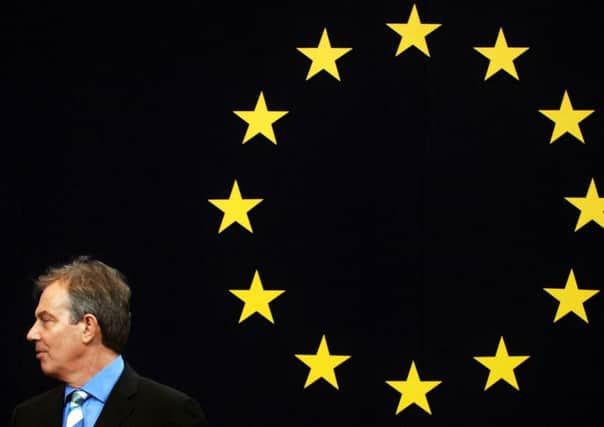Leaders: Boris is worth hearing but Blair must keep quiet


The first major speech by the Mayor of London, Boris Johnson, since he openly declared his hand on the other side from the Prime Minister in the EU referendum debate is to be welcomed. Although viewed from Scotland it is difficult to see exactly why the ebullient Mr Johnson exerts any influence in national politics, it appears that he does, so we should accept that and carry on.
Unusually for Mr Johnson, he has moved on from simple bluster and noise and actually brought some new information to inform the debate. After the familiar soundbites that leaving the EU would be “a win/win” and that the “only thing we have to fear is fear itself”, he did point at the sort of trade agreement Britain might expect to emulate once it was no longer a member of the European Union.
Advertisement
Hide AdAdvertisement
Hide AdThe fact that he admits the potential impact on trade would necessitate a trade deal is perhaps the biggest item to dwell on. That’s a big admission. He points to the deal Canada has negotiated on trade. This is illuminating but there are several reasons why looking at Canada might not be of great benefit to the public, Mr Johnson or his cause.
Firstly, it has yet to be ratified, but has taken somewhere in the region of seven years to get to even this stage. And that is the EU talking to a country that has not rejected it and everything it stands for. And they speak French. The Canadian treaty has been held up as a way that trade can continue without any contribution to the EU’s budget, but there are significant differences between Canada and the UK other than just the state of our relationship. The UK is far more reliant on financial services, which would be harder to negotiate, and the Canadian deal does not include the service industry, which is of vital importance to the UK.
But at least Mr Johnson’s intervention did drive the debate on, By looking at the economy he demonstrates he understands at least what is going to matter to voters. The same cannot be said of former prime minister Tony Blair.
Lending his dubious weight to the campaign for the UK to remain in the EU, Mr Blair said he wanted more passion from supporters and that they should shout out “what we believe not just as a matter of economic realism, but as a matter of political idealism”.
It would appear Mr Blair does not understand that what will guide most people’s vote is not political idealism. For the majority of voters, their biggest priority will be how any withdrawal from the EU might impact on their pockets in the first instance, then the economy as a whole. Although many people will have a view that a joined-up Europe has made a considerable contribution to a peaceful Europe, the fact remains that immediate economics will take precedence for most of them.
Perhaps the campaign to keep the UK in Europe would be better served by asking Mr Blair to resist making any further interventions, because there must be a view now that anything he says, given his current lack of popularity, will only adversely affect any cause he is advocating.
Security yes, but with a light touch
Tomorrow marks the 20th anniversary of one of the darkest days in modern Scottish history, when 16 schoolchildren and their teacher were shot dead in the gymnasium at Dunblane Primary School.
By chance, the date falls just days after a teenager was convicted of culpable homicide over the stabbing to death of a 16-year-old during a row at an Aberdeen high school. The victim was killed by a knife wound to the chest, and the killer was also found guilty of having a knife and knuckledusters at the school. In that context, it cannot be a surprise that a poll has found 60 per cent of those who were surveyed support the installation of metal detectors at schools to help prevent weapons being taken into the premises.
Advertisement
Hide AdAdvertisement
Hide AdBut the weapons involved in these two cases should be banned from all establishments, and if schools are to be equipped with metal detectors, then so must every public place. We have to remember that the horrific events which have been in the headlines this week remain very rare occurrences.
The gun laws were changed after Dunblane, placing heavy restrictions on ownership, and security in schools improved as part of measures recommended following the tragedy. In the case of the Aberdeen killing, metal detectors could stop pupils bringing in weapons, but would not be able to prevent a pupil gaining access to a knife where the implement remains a necessary tool.
The call for metal detectors at schools is well intentioned but our places of learning should not be turned into fortresses. If there remain any continued concerns over security, post Dunblane, it should be possible to resolve them without resort to heavy measures.